Grades and Levels Explained
If you are confused about the difference between grades and levels, hopefully, this short guide will clear up any confusion and why understanding the difference is important to you and to your child’s future career pathways.
A grade is what you are awarded at the end of your GCSEs, and they range between 1 and 9, the latter being the highest number you can achieve.
The level is the type of qualification. For example, GCSEs are Level 2 qualifications.
An example would be:
|
Subject |
Qualification |
Grade |
|
Maths |
Level 2 (GCSE) |
5 |
Level 3 (A-Levels) are graded from E to A*
Btecs, also Level 3 Qualifications, are graded as Pass, Merit, Distinction, Distinction*
So why is this important?
Well, it’s all about progression. Ideally, if you want to stay in education for as long as possible, you would like to progress smoothly from Level 1 to Level 8 and then become a teacher or lecturer. But as we all know, life seldom runs smoothly. There are jumping-off points along the way, such as Apprenticeships and work. If there is one piece of wisdom I would like you to share with your child, it would be:
Picture a number of open doors, each representing an opportunity. Don’t let anyone close a door, and never close any yourself, especially ones marked Maths and English.
So, in a classic mixing of metaphors, here’s a quick look at some of the potential bumps in the road that could close some of your doors.
Entry Requirements for Sixth Form
After taking and passing your Level 2 (GCSEs), by law you have to stay in education or training for a further two years.
However, your child can’t automatically progress to study Level 3 (A-Levels, T-Levels) because each school or further education college impose Entry Requirements, and these are not standard; some might be harder and some easier to achieve. If we take The Cottesloe Sixth Form as an example, our Entry Requirements are pretty much in line with most Sixth Forms in or around this area.
- Your child needs at least a Level 2 (GCSE) grade 4 in Maths and English
- Your child needs a Grade 6 in the subjects they want to study. There are some exceptions.
- Your child needs a total of 38 points - each grade is given a tariff of points equal to the grade achieved. For example, a grade 5 equals 5 points.
- These points can only be taken from 8 subjects.
This is why it’s important to monitor your academic progress and take particular note of mock results.
It will be clear from Year 10 whether these Entry Requirements are likely to be met. If there is any doubt, it would be wise to encourage your child to look at the college pathway as they offer Level 2 courses and the entry requirements will be more achievable. The range of courses offered at a college is also much broader.
Year 8 parents sometimes say that it is too early for their child to think about careers and that no one knows at that age what they want to do in the future. I totally agree, that’s why the first item on my tip-list below is to encourage your child to work smarter and more consistently. This applies to any age group and can mediate a lot of issues in the future.
Here are some tips you can share for achieving the Entry Requirements:
- Work smart and consistently
- Don’t let your Maths and English grades slide
- When calculating your total points, remember that English counts as two subjects (Literature and Language) each with points attached.
- Similarly, Science can count as 1, 2 or 3 subjects (Single, Combined or Triple).
- When looking at the minimum entry requirement of a Grade 4 in Maths and English, If you have already achieved a 4 or above in Statistics, this can count as Maths and you can count your best grade out of the two English results.
Subject Choice for Sixth Form
Sometimes a school doesn’t offer the subjects your child wants to study. If this is the case, they must look at alternatives. All colleges and most schools produce a Sixth Form prospectus and somewhere will give you the combination of Level 2 or 3 courses they want.
University Technical College (UTCS)
Is your child more practical than academic? Does your child find the idea of studying up to 10 subjects overwhelming? Did you know that there is another educational pathway from Year 10?
If it’s clear from an early stage that the curriculum offered at school isn't meeting your child’s needs, we recommend considering a UTC, a Technical College might be the answer. If things are not working out and it looks unlikely that you will reach the entry requirements to stay on at school, this is a very good alternative and the earlier you make that decision the better.
Transferring to a UTC can happen at three key points, at the end of Year 8 and Year 9 and at the end of Year 11.
For more information on UTCs: See https://www.cottesloe.bucks.sch.uk/curriculum/careers-hub/utcs
A guide to all the levels (qualifications)
Finally, here’s a guide to all the levels (qualifications) available at school and college:
|
Level |
Qualifications |
|
1 |
Functional Skills/Pathways to Progression |
|
2 |
GCSE |
|
3 |
A Level* or T Level** |
|
4 |
Certificate* |
|
3-6 |
Diploma* |
|
6 |
Degree* |
|
7 |
Masters* |
|
8 |
PHD |
**T-Levels or Technical Levels are the same as 3 A-Levels and are offered at College.
* Levels 3 - 7 also apply to Apprenticeships



